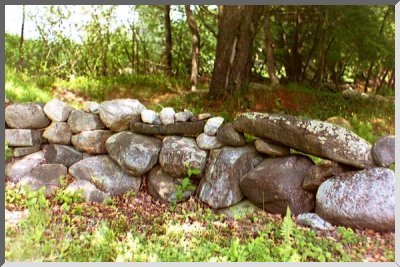|
Or, first you can read Gene's comments about the Poem:
SYMBOLISM!!
If you read what I wrote on the first page,
then you know why I love
Frost. The paragraph next to my picture says it. My favorite poems
are the ones on this site. My special favorite is "Mending wall".
My 10 acre piece of property is completely surrounded by a stone wall,
six feet thick in some places! It is built completely of stones picked
up from the fields where someone spent 200 years trying to scratch a
living out of this ground. And I have "mended" parts of it! And I'm
not sure what is being walled in, and what is being walled out!
The best part about "symbolism" in literature is that it can mean
many things to many people. That's the whole point! If the Poet had
something very, very definite to say, he would spell it out in plain
English; and it would then not mean as much to you, because it just
wouldn't be a "picture" painted in your mind. And remember this:
Perhaps the Poet HAD nothing specific to say, and merely wanted you to
experience HIS vision, or memory, or what have you!
The following is a quote written by Louis Untermeyer in the 1940's.
It is found in "The Pocket Book of Robert Frost's Poems", Henry Holt,
1946. It will tell you what some people think Frost meant. And I agree
with some of it. Pay particular attention to the first two sentences of
the last paragraph. Show them to your teacher and ask him/her if it's
not possible to sometimes read a poem for the sheer enjoyment of the
mental picture it conjures up, and not have to analyze it too much.
Untermeyer's comments:
"The strength of 'Mending Wall', one of Frost's most often quoted poems, rests upon a contradiction. Its two famous lines oppose each
other. The poem maintains that:
" 'Something there is that doesn't love a wall.'
"But it also insists:
" 'Good fences make good neighbours.'
"The contradiction is logical, for the opposing statements are uttered
by two different types of people and both are right. Man cannot live
without walls, boundaries, limits and particularly self-limitations; yet
he resents all bonds and is happy at the downfall of any barrier. In
'Mending Wall' the boundary line is useless:
" 'There where it is we do not need the wall.'
"And, to emphasize the point, the speaker adds playfully:
" 'He is all pine and I am apple orchard.
My apple trees will never get across
And eat the cones under his pines, I tell him.'
"Some readers have found far-reaching implications in this poem. They
have found that it states one of the greatest problems of our time:
whether national walls should be made stronger for our protection, or
whether they should be let down, since they cramp our progress toward
understanding and eventual brotherhood. Other readers have read
'Mending Wall' as a symbolic poem. In the voices of the two men the
younger, whimsical, 'new-fashioned' speaker and the old-fashioned
farmer who replies with his one determined sentence, his inherited
maxim - some readers hear the clash of two forces: the spirit of revolt,
which challenges tradition, and the spirit of restraint, which insists
that conventions must be upheld, built up and continually rebuilt, as a
matter of principle.
"The poet himself frowns upon such symbolic interpretations. He denies
that the poem says anything more than it seems to say. The contradiction
is the heart of the poem. It answers itself in the paradox of people, in
neighbors and competitors, in the contradictory nature of man."
|

